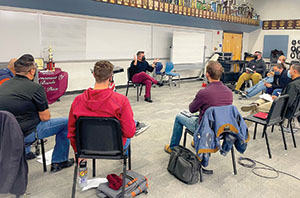Although they aren’t hearing audiences chant their names or light up darkened venues with flickering smartphone lights, Steven Smyth and Jake Taylor are a well-known music duo in demand in New Mexico music classrooms.
Since pandemic restrictions have lessened, Las Cruces Public Schools and other districts around the state are inviting the two NMSU music professors to share ideas with students and music teachers.
“We’re another set of ears for these music directors and we talk to the students – it’s just a matter of encouraging them for music,” Smyth says. “Both of us were public school teachers. We’re able to bring our own experiences or even lend an ear to our colleagues and strategize with them on what we have done or what we’ve seen in different areas of the country to support their music education programs.”
Las Cruces Public Schools fine arts specialist Joseph Flores describes the music professors’ professional development session as “articulate, engaging and personable,” and filled with many valuable resources and take-aways. Flores says “It is clear, in every possible way, that they are both master educators.”
The professors say they gain just as much from the exchange with music teachers who may support band, choir and orchestra as well as mariachi guitar ensembles.
“All those activities from elementary through high school, they’re back and they’re performing and rehearsing in class,” Taylor says. “That’s one of the main reasons why it’s so important that we get out into those schools where they’re making music in person.”
Smyth and Taylor take their NMSU music education students with them, providing the students an opportunity to network and build relationships in public schools that will eventually get them hired.
“We take our future music educators with us to observe and we take our ensembles to either perform for the students or perform at their concerts for their families and the community,” Taylor says.
During the pandemic, NMSU continued to support public school music programs, but in different ways.
“Especially in that situation, they needed resources,” Smyth says. “We would provide adjudication for individual lessons and solos and we made videos for students to stay involved.”
Smyth encourages students by telling them employers want to hire graduates who can work within diverse groups and music can help them gain those skills. For example, he says NMSU’s marching band, the Aggie Pride Band, has 235 students. About 25 are music majors while as many as 60 percent are engineering majors.
“Employers want diversity,” Smyth said. “The band, the choir and the orchestra have not only the standard kinds of diversity but diversity of personalities. Music gives them an opportunity to mingle with all types of people and to build the collaborative skills they’re going to need.”
Numerous studies have demonstrated that students engaged in music programs outperform their peers on every indicator from grade point average to graduation rates. The studies also show the more a student participates in music, the more positive those benefits become.
Taylor agrees, but stresses that music can have benefits beyond school or work success.
“When I was a public school teacher, the thing that made me the most proud was when a student left my program, went on and majored in engineering or agriculture, but kept singing or kept playing,” Taylor says. “We try to demonstrate to the students that you can keep making music for the rest of your life.”

1220 Stewart Street
O'Donnell Hall, Suite 301
Las Cruces, NM 88003